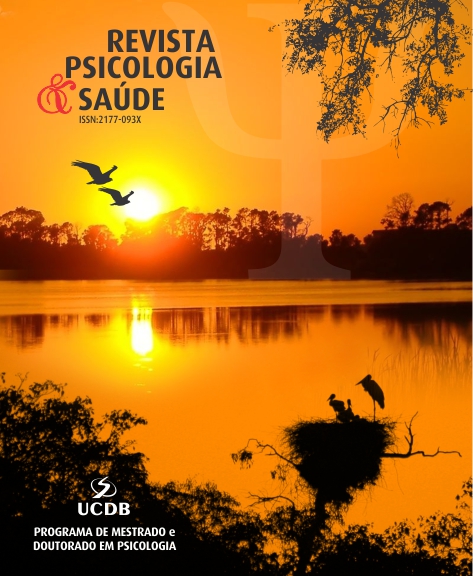Programa Virando o Jogo (CTGP) – Superação: Intervenção Psicossocial para Jovens em Vulnerabilidade
DOI:
https://doi.org/10.20435/pssa.v1i1.2619Palavras-chave:
juventude, jovens, epidemiologia, programas de inovação, vulnerabilidade socialResumo
Objetivo: Descrever escopo do Projeto Virando o Jogo – Programa Superação, realizado com jovens de 15 à 19 anos fora da escola e do mercado de trabalho formal em Fortaleza, CE, e analisar perfil de atendidos pela intervenção. Metodologia: Estudo descritivo, com análise de dados secundários da plataforma JotForms, registro das intervenções realizadas por psicólogos e assistentes sociais, de 2020 a 2022. Intervenções alicerçadas na perspectiva da psicologia social e ciências sociais. Resultados: Total foram atendidos 1516 jovens e realizados 444 grupos, 413 visitas domiciliares e 72 encontros com cuidadores. Principal motivo para atendimento psicossocial relacionado a transtornos emocionais, com 171 registros (depressão+ideação suicida+ansiedade). Conclusão: Escuta qualificada de jovens propicia a compreensão dos problemas mais relevantes, que dificultam suas relações familiares e sociais. Intervenções inovadoras com jovens e familiares, em situação de vulnerabilidade social, são necessárias para minimizar os conflitos internos e melhorar o padrão socioemocional.
Referências
Álvarez, H. G. (2016). Young people who study in Chile (NINI): An Study of its Determinants. Thesis to opt for a Master's degree in Public Policy. University of Chile.
Araújo, I. A. A. (2020). Pedagogical Practices and Gender Studies: Valuing Diversity and Promoting a Culture of Peace (Dissertação de Mestrado em Psicologia, Centro Universitário de Brasília).
Balarezo López, G. (January-July, 2019). Generation of children: Young people who study or work. Paideia XXI, 9(1), 77–103. DOI: https://doi.org/10.31381/paideia.v9i1.2266
Barriga Clavijo, M. L., & Castillo Robayo, C. D. (2017). Young people who don't study or work in Colombia. Economy and Public Policies, 5(2), 59–92. https://sites.google.com/site/economiaepoliticaspublicas/n%C3%BAmeros-anteriores/v-5-2-2o-semestre-de-2017 .
Benjet C., Hernández-Montoya D., Borges G., Méndez E., Medina-Mora M. E., & Aguilar- Gaxiola S. (2012). Youth who neither study nor work: Mental health, education and employment. Salud Publica Mexico, 54, 410–417. DOI: https://doi.org/10.1590/S0036-36342012000400011
Brotfeld, C., & Berger, C. (2020). The role of empathy and openness in the intimacy of adolescent friendships. Revista de Psicología, 29(2), 26–39. https://www.scielo.cl/scielo.php?pid=S0719-05812020000200026&script=sci_abstract&tlng=en https://doi.org/10.5354/0719-0581.2020.52231 DOI: https://doi.org/10.5354/0719-0581.2020.52231
Cardoso, G., & Hermeto, A. (2021). Detailing the activity profile of Brazilian young people who do not study or work: The role of job seeking and household chores. Brazilian Journal of Population Studies, vol. 38, 1–20 https://www.scielo.br/j/rbepop/i/2021.v38/ https://doi.org/10.20947/S0102-3098a0164 DOI: https://doi.org/10.20947/S0102-3098a0164
Every Life Matters Committee, & ALECE. (2017). Every Life Matters Report.
Every Life Matters Committee, & ALECE. (2020). Every Life Matters Report.
De Paula, L. D., & Branco, A. U. (2022). Deconstructing prejudice in schools: The role of dialogical practices. Psychology Studies (Campinas), vol. 39, e200216. https://doi.org/10.1590/1982-0275202039e200216en DOI: https://doi.org/10.1590/1982-0275202039e200216en
Fundo das Nações Unidas para a Infância [UNICEF]. (2008). Strengthening family skills. https://www.unicef.org/brazil/fortalecimento-das-competencias-familiares
Gutiérrez García, R. A.; Martínez, K. I.; Pacheco Trejo, A. Y. (2014). Young people who don't study or work in Mexico. Enseñanza e Investigación en Psicología, 19(2), 1–12. https://www.redalyc.org/articulo.oa?id=29238007007
Harris, J. M., Ciorciari, J., & Gountas, J. (2019). Consumer neuroscience and digital/social media health/social cause advertisement effectiveness. Behavioral Sciences, 9(4), 42. https://doi.org/10.3390/bs9040042 DOI: https://doi.org/10.3390/bs9040042
Holanda M., K. (Org.) (2023). Child and adolescent mental health in public institutional contexts (1ª ed.). Graphic Expression and Publishing.
Instituto de Pesquisa e Estatística Econômica do Ceará. (2018). Quarterly youth bulletin. Government of the State of Ceará. www.ipece.ce.gov.br
Instituto de Pesquisa e Estatística Econômica do Ceará. (2021). Quarterly Youth Bulletin. Government of the State of Ceará. www.ipece.ce.gov.br
Martino-Bermúdez, M., & López, F. (2017). Young people who don't study or work in Uruguay. The experience of the Youth Program in Red. Revista Latinoamericana de Ciencias Sociales, Niñez y Juventud, 15(2), 861–876. https://doi.org/10.11600/1692715x.1520502032015 DOI: https://doi.org/10.11600/1692715x.1520502032015
Organização para Cooperação e Desenvolvimento Econômico. (2023). Education at a Glance 2023: OECD Indicators. https://doi.org/10.1787/e13bef63-en DOI: https://doi.org/10.1787/e13bef63-en
Pereira- Guizzo, C. S., Del Prette, A., Del Prette, Z. A. P., & Leme, V. B. R. (2018). Social skills program for teenagers in preparation for work. School and Educational Psychology, 22(3), 573–581. https://doi.org/10.1590/2175-35392018035449 DOI: https://doi.org/10.1590/2175-35392018035449
Piagentini, S., & Camargo, E. A. O. (2018). Neurosciences, Yoga and Education. Revista de Pós-Graduação Multidisciplinar – RPGM, 1(3), 237–250.
Instituto Brasileiro de Geografia e Estatística. (2022). Pesquisa Nacional por Amostra de Domicílios Contínua – PNAD-c.
Prefeitura de Fortaleza. (2010). Human development, by neighborhood, in Fortaleza. http://www.fortaleza.ce.gov.br/sde .
Rassial, J. J. (Org.). (2012). Children and adolescents: Enchantment and disenchantment (1ª ed.). Language Institute.
Rassial, J. J. (1997). The teenage passage. Arts and Crafts.
Rolim, M. (2018). Withdrawal from crime. Society and State, 33(3), 829–848. https://doi.org/10.1590/s0102-6992-201833030008 DOI: https://doi.org/10.1590/s0102-6992-201833030008
Salata, A. R., & Ribeiro, M. G. (1st Quarter 2022). Inequality in metropolises, 8. https://www.observatoriodasmetropoles.net.br/
Sánchez, R. M. (June, 2021). Young people who don't study in work (NINIS) in Colombia Youth not in Employment, Education or Training (NEET) in Colombia. Documents FCE-CID Escuela de Economía, No. 118.
Singla, D. R., Waqas, A., Hamdani, S. U., Suleman, N., Zafar, S. W., Zill Huma, Saeed, K., Servili, C., & Rahman, A. (2020). Implementation and effectiveness of adolescent life skills programs in low – and middle-income countries: A critical review and meta-analysis. Behavioral Research and Therapy, 130, 103402. https://doi.org/10.1016/j.brat.2019.04.010 DOI: https://doi.org/10.1016/j.brat.2019.04.010
Skeen, S., Laurenzi, C. A., Gordon, S. L., Du Toit, S., Tomlinson, M., Dua, T., Fleischmann, A., Kohl, K., Ross, D., Servili, C., Brand, A. S., Dowdall, N., Lund, C., Van der Westhuizen, C., Carvajal-Aguirre, L., De Carvalho, C. E., & Melendez-Torres, G. J. (2019). Adolescent mental health program components and behavioral risk reduction: A meta-analysis. Pediatrics, 144(2), e20183488. https://doi.org/10.1542/peds.2018-3488 DOI: https://doi.org/10.1542/peds.2018-3488
Taffarel, C. N. Z., & Beltrão, J. A. (2019). Destruction of productive forces and the downgrade of the working class: The case of the BNCC reform of secondary education. Germinal: Marxism and Education in Debate, 11(1), 103. https://doi.org/10.9771/gmed.v11i1.32000 DOI: https://doi.org/10.9771/gmed.v11i1.32000
Ziebold, C., Evans-Lacko, S., Andrade, M. C. R., Hoffmann, M. S., Fonseca, L., Barbosa, M. G., Pan, P. M., Miguel, E., Bressan, R. A., Rohde, L. A., Salum, G. A., De Jesus Mari, J., & Gadelha, A. (2022). Childhood individual and family modifiable risk factors for criminal conviction: A 7-year cohort study from Brazil. Scientific Reports, 12(1), 13381. https://doi.org/10.1038/s41598-022-13975-8 DOI: https://doi.org/10.1038/s41598-022-13975-8
Publicado
Como Citar
Edição
Seção
Licença

Este trabalho está licenciado sob uma licença Creative Commons Attribution 4.0 International License.
Os artigos publicados na Revista Psicologia e Saúde têm acesso aberto (Open Access) sob a licença Creative Commons Attribution, que permite uso, distribuição e reprodução em qualquer meio, sem restrições, desde que o trabalho original seja corretamente citado.







.jpg)





